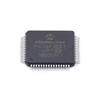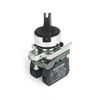An integrated circuit is a small electronic device that consists of several electronic parts, such as transistors, resistors, capacitors, and diodes, all mounted on a single semiconductor substrate. “chip” or “microchip” is also frequently used to describe it. To carry out certain jobs or activities, including data processing, switching, amplification, and logic operations, the components of an integrated circuit are coupled to one another. In contrast to employing separate electrical components, integrating these components into a single chip may make the circuit smaller, more dependable, and more efficient.
Digital integrated circuits (ICs) and analogue integrated circuits are only two examples of integrated circuits’ many types and designs. Microprocessors and memory chips employ digital ICs to process digital signals and carry out logical operations. Continuous analogue signals, such as those from amplifiers and sensor interfaces, are processed using analogue integrated circuits (ICs). The creation of increasingly compact and potent electronic devices was made possible by introducing the integrated circuit, which revolutionized the electronics area. Integrated circuits are used in various products, including consumer electronics (computers and smartphones), industrial machinery, medical equipment, communication systems, and many more everyday items.
How important is an Integrated Circuit (IC)?
A miniaturized electronic circuit called an integrated circuit (IC) comprises several electronic parts, including transistors, resistors, capacitors, and diodes, that are manufactured onto a thin semiconductor material, usually silicon. These parts work together to carry out particular tasks like signal processing, switching, or amplification. ICs are crucial for a number of reasons:
- Miniaturization:
ICs make it possible to combine many electronic parts into a single chip. Electronic gadgets that are portable and light, including wearable laptops and smartphones, are made possible by this miniaturization. These gadgets would be substantially bulkier and less useful without ICs.
- Increased reliability:
ICs provide superior dependability to discrete electronic components since they are produced by tightly regulated procedures. The compact design increases electrical equipment’s overall performance and endurance by lowering the likelihood of loose connections or defective cabling.
- Higher performance of integrated circuit:
Greater performance is made possible by the combination of many parts on a single chip, which speeds up signal processing and expands functionality. ICs outperform discrete components in complicated operations and computations, resulting in enhanced performance across various industries, including computers, telecommunications, and consumer electronics.
- Power effectiveness:
Compared to conventional circuits, ICs are built to run with less power. ICs may lower energy usage, increase battery life, and minimize heat generation by optimizing the design and cutting-edge manufacturing processes.
- Cost-effectiveness:
Electronic products are now more reasonably priced thanks to the mass manufacture of ICs. The cost per unit may be decreased by producing hundreds or even millions of ICs on a single silicon wafer, making technology more affordable for many users.
- Scalability:
ICs can be scaled, allowing for differing performance and complexity demands to be accommodated in their design. ICs may be customized to match application demands, from basic logic gates to extremely complex microprocessors, enabling improvements in various industries.
What are the Various Integrated Circuit Types?
Transistors, diodes, resistors, and capacitors are just a few of the electronic components that make up integrated circuits (ICs), which are electronic devices made from semiconductor materials that have been built onto a single semiconductor material. There are several varieties of integrated circuits, each created for a particular need. Following are some popular types of integrated circuit:

Digital Integrated Circuits:
Electronic components known as digital integrated circuits (ICs) are employed largely to process and store digital data. They consist of microprocessors, logic gates, flip-flops, counters, and shift registers. Computers, cell phones, and other digital devices use digital ICs often.
Analog Integrated Circuits:
Integrated circuits (ICs) for processing continuous analogue signals are called analogue ICs. They comprise oscillators, filters, voltage regulators, and amplifiers. Audio systems, power management, wireless communication, and sensor applications use analogue ICs. Analogue ICs are integrated circuits that can continuously handle a wide range of signals. Analogue ICs are extensively utilized in various applications, including sensor interfaces, wireless communication systems, audio and video processing, power management, and measurement and control systems. They are essential for amplifying, filtering, modulating, demodulating, and conditioning analogue signals to provide correct and trustworthy information for subsequent processing.
Mixed-Signal Integrated Circuits (ICs):
These chips blend analogue and digital circuitry. They are utilised as an interface between the digital and analogue worlds to facilitate communication and control between digital systems and the physical world. Data converters, sensor interfaces, and audio/video processing applications use mixed-signal integrated circuits (ICs).
Microcontrollers:
A microprocessor core, memory, input/output interfaces, and various peripherals are all combined on specialized integrated circuits (ICs) known as microcontrollers. They are made with control tasks in embedded systems in mind. Applications for microcontrollers include industrial automation, automobile systems, and household appliances.
Application-Specific Integrated Circuits:
Application-Specific Integrated Circuits are ICs specially built for certain uses or tasks. They offer great performance and low power consumption since they are designed specifically to fit the needs of a certain system. ASICs are employed in several industries, such as telecommunications, transportation, and aerospace.
Field-Programmable Gate Arrays (FPGAs):
FPGAs are ICs that can be modified after manufacture to carry out certain tasks. They are made up of a matrix of programmable interconnects and logic components. Digital signal processing, prototyping, and low-volume production all use FPGAs extensively.
Conclusion:
Today, integrated circuits (ICs) are found in almost all electronic devices, including microwaves, cell phones, and computers. It is necessary for practically every electrical device’s design and manufacture. EASYIEE Technology Ltd specializes in a range of international electronic components and semiconductor products with product design, development, procurement, quality management, and logistics services; its products include electromechanical components, chip solutions, display panels, memory, power system solutions, multimedia system solutions, Internet home automation, and semiconductor lighting solutions.





 2023-05-24
2023-05-24 


